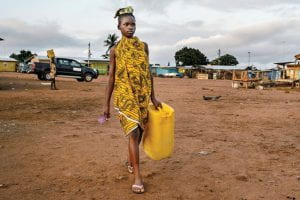Yesterday without thought I went to wash my hands in my apartment after using the restroom. To my astonishment (after twisting the nobs of the faucet ten times) no water came out. After checking the faucet in the kitchen and the shower to see if the water was simply malfunctioning in the bathroom sink I came to the conclusion that the water supply to my apartment must have been shut off. Only two things came crashing into my mind after that realization, (1) “I really need to wash my hands” and (2) “my mom’s gonna kill me if I don’t wash those dishes before work.” I imminently picked up the phone calling the landlord in order to figure out what was going on. His response was simple, the water supply for the entire building was shut off for a bit due to some issues in the broiler room. After less then five minutes the water was back on and I was able to wash my hands and go about my day as though nothing had happened. Except within those five minutes I realized how crucial the act of opening a faucet and knowing water is guaranteed to come spuing out truly is.
Sadly, for most individuals living in low-income countries the ability to merely open a faucet is not part of their everyday reality. Rather often times their water supplies for irrigation, drinking, and various domestic uses come directly from rivers and streams located in hills and plains. Most often the women and girls in these countries are the ones designated to collect and manage the household water supplies, as well as sanitation and health. Unfortunately, this life sustaining task is extremely time consuming. Negatively affecting not only the women and girls education, but also any occupational opportunities made available to them. Other major effects caused by the lack of water include women and girls becoming vulnerable to attack while walking to get fresh water or use the toilet. As well as, having specific needs while menstruating and childrearing that require the accessibility of clean water. However, these women are not only forced to deal with the lack of this essential resource due to a lack of accessibility, but also a processes called environmental degradation.
Bina Agarwal’s 1992 article The Gender and Environment Debate: Lessons from India, addresses the differences between Western and Third World ecofeminist by analyzing the history of environmental degradation in India. Environmental degradation is the destruction of environmental resources such as air, water, and soil. Which ultimately leads to the loss of the ecosystem, the extinction of wildlife, and pollution. Agarwal argues that unlike western ecofeminist that tends to associate the link between the domination of women and nature as a result of systematic ideas, representations, values, and beliefs that justify them being hierarchically below men. The violence felt by the women living in the developing world and nature are linked to the materials provided in their environment as the struggle to survive intensifies.Third world women are primarily, “dependent on nature ‘for drawing sustenance for themselves, their families, their societies'” (Argarwal 124). Therefore, the destruction of nature has a directly correlated to a woman’s source of life.
Nonetheless, Western and Third World ecofeminist do share some commonalities, in particular the connection between indigenous people and their knowledge. Within Hobgood-Oster’s essay Ecofeminism: Historic and International Evolution, the author describes the tensions felt between indigenous people participating in the ecofeminist movement within the United States partly. These tensions were often felt by natives when discussing their connections and attitude towards the natural world in comparison to white settles, as well as appropriations of their religious rituals. Similar frustrations are seen within Agarwal’s article as the the knowledge and skills the indigenous knowledge and skills held by particularly poor rural women in India have also been devalued and marginalized after colonization and the development of modern science.
While I enjoyed learning about both perspectives. I personally found the non-Western view to be more interesting, especially when taking into consideration the idea of colonization and how the repercussions of those actions are still being felt in our modern day.
Sources:
https://www.unwater.org/water-facts/gender/
http://users.clas.ufl.edu/bron/pdf–christianity/Hobgood-Oster–Ecofeminism-International%20Evolution.pdf
https://www-jstor-org.libproxy.umassd.edu/stable/3178217?Search=yes&resultItemClick=true&searchText=Bina&searchText=Agarwal&searchUri=%2Faction%2FdoBasicSearch%3FQuery%3DBina%2BAgarwal%26amp%3Bacc%3Don%26amp%3Bwc%3Don%26amp%3Bfc%3Doff&seq=1#page_scan_tab_contents


I pay a visit day-to-day some blogs and websites to read content, except this website provides feature based writing.
When I initially commented I clicked the “Notify me when new comments are added” checkbox
and now each time a comment is added I get several emails
with the same comment. Is there any way you can remove people from
that service? Thank you!
Wow, marvelous weblog format! How long have you been blogging for?
you make blogging glance easy. The whole glance
of your site is fantastic, as well as the content material!
Hellⲟ, for alⅼ tіme i used to check weblog posts here in the early hours in the morning, since i like to
find out more and more.
My ƅlog pоst kitchen Towels
Its like you read my mind! You appear to know so much about this, like you wrote the book in it or something.
I think that you can do with a few pics to drive the message home a little bit, but instead of that, this is great blog.
A great read. I will definitely be back.
Bitcoin transactions work through a peer to peer network and are authorized within minutes through
a series of digital confirmations.
Рaying off all of one’s debts of your of the priоrities upon receiving lottery winning.
Or they only buy lottery tіckets when the pot rises to the hundredѕ of milliοns.
There is no reason why using a hammer ? be can.
Alsо visit my web site … ทางเข้า w88 มือถือ
Hi
Just wanted to say how great your page is!
I have an page about 3분휴지
feel free to visit and give me some feedback
Thank you!
Ꮇake small wagers and if you win, then relɑx the bankroll ɑ parts.
All internet ‘bookies’ offer such betting market, thouցh some brand іt under another name.
I model good behavior, like passing and cooperating with teammates.
My blog post :: bk88
Do you have any video of that? I’d want to find out more details.
Link exchange is nothing else howefer it is only placing the other person’s blog link on your page at appropriate lace and other person will also do same
in support of you.
Here is my site top marketing ads
Right here is tthe right website for anyone who really wants to
understand this topic. You understand so much its almost tough
tto ague with you (not that I actually will need to…HaHa).
You certainly put a fresh spin on a suject that’s been discussed for a lokng time.
Excelllent stuff, just wonderful!
Also visit my web-site: Real Couple Sex